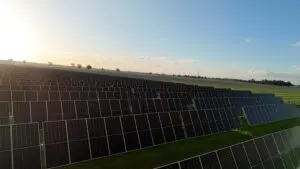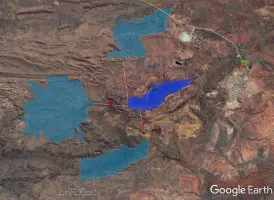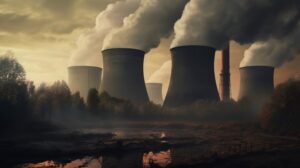Today Green Energy Markets has released the Renewable Energy Index, which is a monthly publication tracking: the amount of power produced from renewable energy; the jobs it’s creating; the power bill savings it is delivering for Australian households and businesses; and the environmental benefits of the rising use of clean power.
The story is an impressive one.
At the end of June, large-scale renewable energy projects under construction were estimated to create enough jobs to employ 8,868 people full-time for a year. Then in our July edition it had grown by more than a thousand to 9,897 job-years (a person employed full time for a year) thanks to the commitment of a further seven projects.

On top of this we estimate almost 4,000 people were employed full-time in installation, design and sales of rooftop solar systems over the 2016-17 financial year. Renewable energy has now grown to 17 per cent of our power supply across the main east and west coast grids, up from about 7 per cent 10 years ago.
Of course much of this will come as little surprise to readers of RenewEconomy who for the most part are deeply engaged in renewable energy – so why do this?
To help explain, I’m going to take you back to the year 1513 when a book was distributed that was intended as a guide for aspiring rulers of Europe. Within it are words of extraordinary, some would say ruthless, wisdom about politics and government that remain incredibly relevant to times today.
But one statement in particular within Niccolo Machiavelli’s The Prince stands out to me. It so perfectly sums up the battle faced those who desperately wish to contain the extent of dangerous global warming. His advice was:
“It must be considered that there is nothing more difficult to carry out nor more doubtful of success nor more dangerous to handle than to initiate a new order of things; for the reformer has enemies in all those who profit by the old order, and only lukewarm defenders in all those who would profit by the new order; this lukewarmness arising partly from the incredulity of mankind who does not truly believe in anything new until they actually have experience of it.”
If we travel back about two decades there was a great deal of research available from academics such as Mark Jacobson, Amory Lovins, and in Australia from Mark Diesendorf and Alan Pears, as well as many others, that demonstrated that the amount of energy that could be harnessed from the sun, wind, water and plant matter (along with sensible energy-efficiency) was vastly greater than amount of energy humans could possibly need.
This was the subsequently further refined by later modelling also from Jacobson and the US National Renewable Energy Laboratory as well as by the likes of Matthew Wright, Ben Elliston, and Andrew Blakers for Australia. This showed that even though the energy available from the wind and sun can vary substantially over time, it could still be affordably and reliably matched to when we needed power.
This modelling work left me in little doubt that it was possible for us to continue to obtain reliable and plentiful amounts of energy to power our lights, fridges, computers, heaters, manufacturing industry as well as transport.
The problem of course was that this was a promise built on physics and maths. A promise built on maths and physics means an awful lot to me, but it doesn’t pay the bills and it isn’t all that good for winning the public over.
That’s especially the case when you’re faced with a set of powerful industry opponents who have an incredible amount to lose if you manage to get your way. And they are more than willing to pay plenty of people’s bills to ensure you lose.
What’s more while you are stuck offering promises of what could be, they can point at real live examples of what we’ve got to lose. They wield like weapons the threat to politicians from the closure of power plants, mines and subsequent job losses that might come from efforts to contain the pollution driving global warming.
When Hazelwood Power Station closed earlier this year we saw wall to wall media reports talking about the hit to the economy of the nearby town of Morwell. We also saw vision over and over again of a line of hardhats tied to the power station fence providing a potent image of the jobs that were lost. And of course there have been numerous articles forewarning of blackouts.
These are tangible and powerful images and stories of lived experience that the general public can immediately understand and relate to.
But in the last few years the renewable energy industry has started to build-up real live, tangible examples of its own that show the promises are backed up by reality. Since October the large-scale renewable energy sector has entered an unprecedented investment and jobs boom. Rooftop solar PV has been the largest source of new power supply over the last 6 years but has just entered a new phase of growth helping not just households, but also businesses contain their power bills.
We have started to see batteries deployed beyond just off-grid applications and should hopefully see a solar power station built in Port Augusta that can supply power in the middle of the night.
The Renewable Energy Index is intended to help the general public see that renewable energy is delivering on its promise – fulfilling a large and growing part of our energy needs while also providing meaningful employment.
Tristan Edis is Director – Analysis & Advisory with Green Energy Markets. Green Energy Markets assists clients make informed investment, trading and policy decisions in the areas of clean energy and carbon abatement.
Edis will be speaking at the Disruption and the Energy Industry conference in Sydney on September 6 and 7.
Follow on Twitter: @TristanEdis









